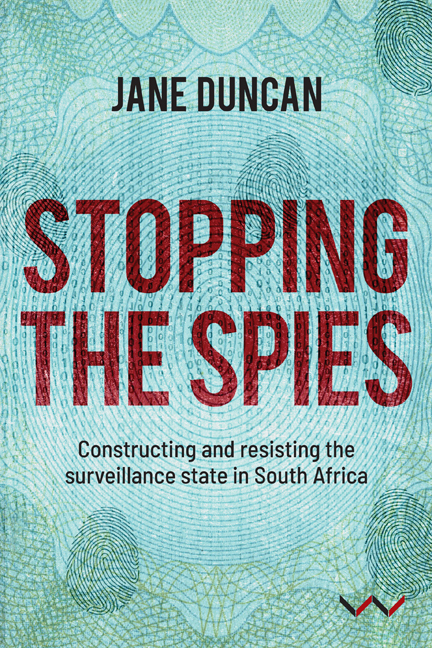Book contents
- Frontmatter
- Contents
- Acknowledgements
- List of Figures and Tables
- List of Acronyms
- Preface
- Introduction
- Chapter 1 Theorising the surveillance state
- Chapter 2 Is privacy dead? Resistance to surveillance after the Snowden disclosures
- Chapter 3 The context of surveillance and social control in South Africa
- Chapter 4 Lawful interception in South Africa
- Chapter 5 State mass surveillance, tactical surveillance and hacking in South Africa
- Chapter 6 Privacy, surveillance and public spaces in South Africa
- Chapter 7 Privacy, surveillance and population management: the turn to biometrics
- Chapter 8 Stopping the spies: resisting unaccountable surveillance in South Africa
- Chapter 9 Conclusion
- Notes
- Select Bibliography
- Index
Chapter 4 - Lawful interception in South Africa
Published online by Cambridge University Press: 17 May 2019
- Frontmatter
- Contents
- Acknowledgements
- List of Figures and Tables
- List of Acronyms
- Preface
- Introduction
- Chapter 1 Theorising the surveillance state
- Chapter 2 Is privacy dead? Resistance to surveillance after the Snowden disclosures
- Chapter 3 The context of surveillance and social control in South Africa
- Chapter 4 Lawful interception in South Africa
- Chapter 5 State mass surveillance, tactical surveillance and hacking in South Africa
- Chapter 6 Privacy, surveillance and public spaces in South Africa
- Chapter 7 Privacy, surveillance and population management: the turn to biometrics
- Chapter 8 Stopping the spies: resisting unaccountable surveillance in South Africa
- Chapter 9 Conclusion
- Notes
- Select Bibliography
- Index
Summary
South Africa had direct experiences of damaging surveillance under apartheid. The potential for abuse is thus still fresh in many people's minds, yet it is unclear how concerned South Africans are today about their privacy. One survey conducted by Ipsos for the Centre for International Governance Innovation came to the unsurprising conclusion that most people believe law enforcement agencies should have a right to access the communications of citizens, especially if someone is suspected of having committed a crime. However, indicative of a greater concern for privacy than in other countries surveyed on the continent, the survey found that South Africans were less likely to agree to this right than people in most of the major world regions surveyed. When asked a different and more pointed set of questions in another survey, about whether the US government should have the right to conduct mass communications surveillance, and whether technology companies such as Google and Yahoo should protect communications privacy from unwarranted access, 66 per cent of South Africans felt that the US should not have this right. Although this score was the third lowest of a total of thirteen countries, it was still high. These surveys suggest that the South Africans surveyed were relatively open to recognising the right of the state to conduct targeted interception as distinct from mass surveillance. The relatively low score in the second survey also suggests that South Africans felt less touched by the Snowden revelations than other countries. In contrast, the countries that felt the most strongly had direct experience of the NSA's excesses, such as Germany and Brazil.
While there is evidence of a growth in the coercive capacities of the South African state, the forms of coercion have changed, and the state has come to place particular emphasis on intelligence work relying, in part, on communications surveillance. This chapter will examine the growth of communications surveillance in South Africa, and will seek to answer the question, how concerned should South Africans be?
LAWFUL INTERCEPTION IN SOUTH AFRICA
Lawful interception is governed by RICA. This replaced the Interception and Monitoring Prohibition Act of 1992, which was passed during the transition to democracy, and which itself replaced the apartheid-era law on interception of communications.
- Type
- Chapter
- Information
- Stopping the SpiesConstructing and resisting the surveillance state in South Africa, pp. 89 - 112Publisher: Wits University PressPrint publication year: 2018



